boating and france
what's not to like?
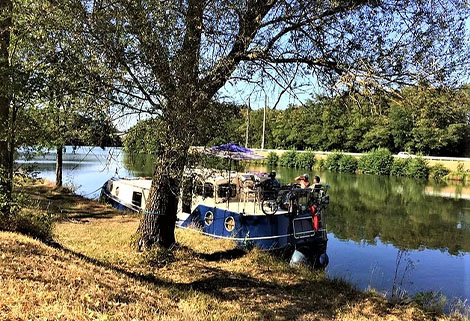 Have you ever thought about the attractions of waterways beyond these islands?
Have you ever thought about the attractions of waterways beyond these islands?
We have been slow as a nation to perceive the incalculable inherent value of our sadly neglected canals.
Our friends over the Channel have long understood the glories of their waterways. The network of navigable rivers and canals in France extends throughout the country, from the deep south to the borders with Germany and Holland – and connects with the networks in those countries and beyond.
They are kept in excellent condition for the commercial traffic that still uses them, but private boating for pleasure is as popular there as here, and it is not hard to see why. Glorious countryside, continental weather, plus great food and drink, have long attracted Brits to France in particular for holidays, and many are now choosing to enjoy them linked to all the pleasures of messing around in boats.
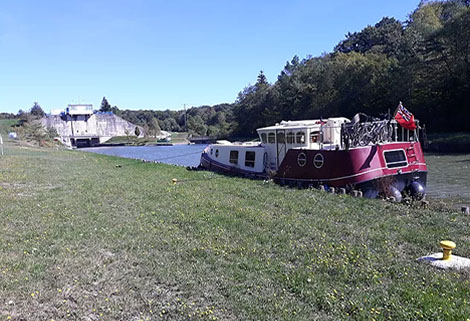 It is of course possible to boat further afield on European waterways, but the closeness of France, its user-friendly network, and its innate attractions make it the number one destination.
It is of course possible to boat further afield on European waterways, but the closeness of France, its user-friendly network, and its innate attractions make it the number one destination.
Major hire companies in the UK have French offerings in their brochures, specialists like LeBoat have huge hire fleets available, and for those who like their cruising to come with maximum comfort and minimum effort, luxury cruises on the major rivers are growing in popularity.
Yet most British canal enthusiasts hardly give France a thought when choosing to invest in a boat or a boat holiday. So let’s look at the pros and cons of boating in France.
the pros
The pros are easy and some of them have already been mentioned.
The variety of scenery in France is staggering, and viewing it from the water is as attractive there as here. And much as we all love traditional pub grub, even the most enthusiastic among us have to admit that fish and chips or cottage pie can pall a little – especially compared with the legendary food and drink available in all the different regions of France.
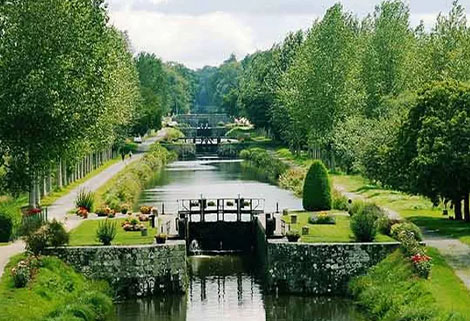
Moreover, from a boating point of view, the two main attractions of France are the breadth of the waterways, and the electrification of locks.
France has no equivalent to our narrowbeam canals and boats; there are variations across the country in terms of maximum beam and length, but it is broadbeam all the way and for private boaters, length is no problem either.
A 50ft by 12 ft craft is ideal for comfortable cruising for four and can go anywhere and moor up anywhere. The size means large double beds, sundecks for relaxing or eating, large kitchens and saloons, and more than one bathroom!
Virtually all locks in France are electrically operated – a boon for those more advanced in years. Systems vary from waterway to waterway, but all benefit from powered paddles and gates so no more jumping on and off, climbing up dodgy handrails, teetering across ancient gate edges, yanking on swing bridges, pushing heavy gates or misplacing paddle keys.
the cons
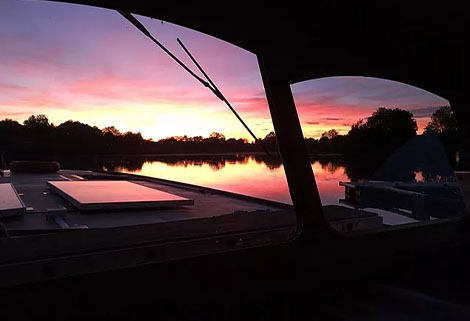 And the ‘cons’ are far less daunting than they can appear. First, you do need someone on the boat to have certification. You will need an International Certificate for Operators of Pleasure Craft (or ICC) to provide evidence that you are competent to handle a boat. In the UK, this scheme is run by the Royal Yachting Association (RYA). If you have had previous boat handling training, you may already have the necessary evidence of qualification for the ICC – the list of acceptable qualifications can be found on the RYA website.
And the ‘cons’ are far less daunting than they can appear. First, you do need someone on the boat to have certification. You will need an International Certificate for Operators of Pleasure Craft (or ICC) to provide evidence that you are competent to handle a boat. In the UK, this scheme is run by the Royal Yachting Association (RYA). If you have had previous boat handling training, you may already have the necessary evidence of qualification for the ICC – the list of acceptable qualifications can be found on the RYA website.
Don’t worry if you do not currently qualify. You simply need to take an RYA Inland Waterways Helmsman’s Course. This is a practical course, takes 2 days, and costs in the region of £300. Details of the course and of a training centre near you can also be found on the RYA site. If you have a partner who would benefit from basic crew training, this can often be done at the same time for a modest additional cost (as little as £25), making it a very enjoyable two days on the water. The relevant RYA course is the Inland Waterways Crew Course. There is no exam at the end of either course – you just do the two days and you get your ICC.
The other Certificate you will need is a Code Européen des Voies de Navigation Intérieure (CEVNI). This is like a Highway Code for European waterways, covering signs, rules and procedures. It looks daunting but is really mostly common sense. The CEVNI is only available to those holding an ICC. If you already qualify (see above), you can apply to take the test at a recognised centre or online. If you are going to take an RYA Inland Waterways Helmsman’s Course, the CEVNI test can be administered at the same time for a nominal cost (£30). The test is multiple choice and pretty much no one ever fails! For anyone who has been on the receiving end of incompetent UK hirecraft helmsmen, it might be a good idea in the UK required something similar!
The other major ‘con’ is cost. Boating is not a cheap pastime wherever you do it. It is a brave man who buys a boat, especially if he is only going to use it for a few weeks in the year. Insurance, maintenance, mooring etc. are not cheap, here or in France. The old adage is that whatever you spend to buy the boat, assume you will need to spend 10% of that every year just to keep it.
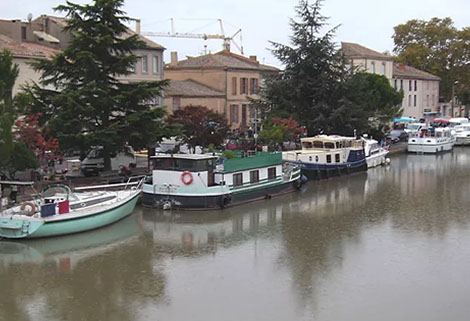 The cost of a boat appropriate for French waterways will be higher than for UK narrowboats because you need a different kind of boat for river conditions – widebeam, with a protected prop and rudder, and a strong diesel engine. You can easily spend £250,000 and upward for such a boat new; a decent second hand similar craft would cost around the £100,000 mark.
The cost of a boat appropriate for French waterways will be higher than for UK narrowboats because you need a different kind of boat for river conditions – widebeam, with a protected prop and rudder, and a strong diesel engine. You can easily spend £250,000 and upward for such a boat new; a decent second hand similar craft would cost around the £100,000 mark.
Of course, you can use a flat bottomed narrowboat in France, and some do, but it is not ideal. On the other hand, the cost of hire craft has now reached crazy levels – again, both here and in France. And of course, if you love boating as a pastime, there is nothing quite like owning your own boat.
Luckily these days, there is a middle way – boat share. This is growing in popularity across Europe as a way of having your cake and eating it – all the pride and pleasure of ownership, but with the worry and cost of maintenance shared with other friendly, likeminded people.
boat share
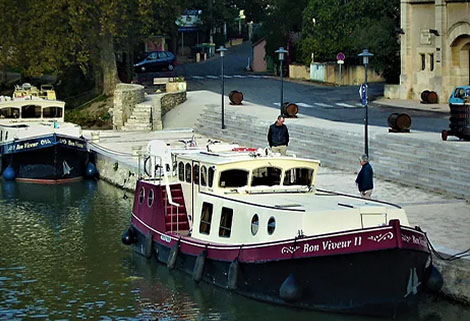
Boat share, like holiday time share on land, has rightly had bad press in the past. Greedy and/or incompetent management companies were to blame. Luckily, most of these have gone out of business and the ones that remain provide a reputable service.
Alternatively, many boat share schemes now cut out the management companies altogether and are run by syndicates of owners who undertake the task of management themselves: think freehold vs leasehold flats. In these ‘freehold’ schemes, syndicate members who enjoy fiddling around on their boats, maintaining, repairing and upgrading, do so together in annual working parties. Others contribute their administrative, financial and marketing skills to the common purpose. And for those big expenditures like winter mooring or repainting, the cost of bringing in the professionals is shared among owners. The way it works is simple: find a boat syndicate you like; buy a share of weeks; pay a yearly running cost contribution (agreed at an AGM); and enjoy.
Annual running cost contributions for a French boat share vary but are usually in the region of £3-500 per week owned. The only costs on top of that are fuel and mooring fees. Fuel for a 2 week holiday should not be more than a few hundred pounds and mooring is either free if you choose, as many do, to ‘wild’ it, or about £20-25 per night in a marina with water, power and shore bathroom facilities: comparable to European caravan site fees.
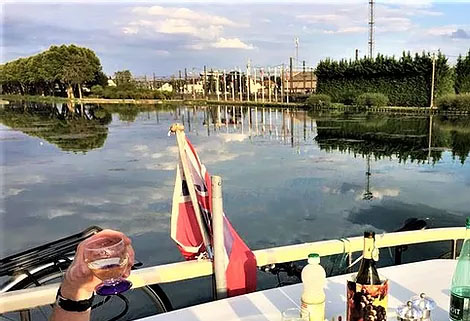 Of course, there is an initial capital outlay – typically £2-3,000 per week purchased, but this can be recouped if and when you want to sell. Think of it this way: a bank loan of £2,500 to buy a week would cost just £125 a year at, say, at 5% p.a. interest. Add that to that, say, £400 per week running costs makes a total of around £525 a year. That wouldn’t hire even the smallest craft for a week in low season, let alone a luxury 50 ft widebeam craft. Or of course you can spend a six figure sum on a depreciating asset, another 10% every year on maintaining it, and then use it for just a few weeks. Just ‘do the math’ as they say over the pond.
Of course, there is an initial capital outlay – typically £2-3,000 per week purchased, but this can be recouped if and when you want to sell. Think of it this way: a bank loan of £2,500 to buy a week would cost just £125 a year at, say, at 5% p.a. interest. Add that to that, say, £400 per week running costs makes a total of around £525 a year. That wouldn’t hire even the smallest craft for a week in low season, let alone a luxury 50 ft widebeam craft. Or of course you can spend a six figure sum on a depreciating asset, another 10% every year on maintaining it, and then use it for just a few weeks. Just ‘do the math’ as they say over the pond.
If the idea of boat share in France interests you (and why not?!), a good website to explore is www.boatsharefrance.com. It has sections on Why France?, Why Boat Share? and How it Works?, providing answers to all the most common questions.
